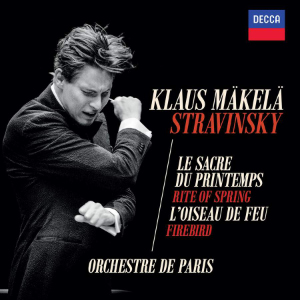
Igor Stravinsky (1882-1971)
The Firebird (1910)
The Rite of Spring (1913)
Orchestre de Paris/Klaus Mäkelä
rec. 2022, Philharmonie de Paris
Decca 485 3946 [83]
Still only in his mid-twenties, Finnish conductor Wunderkind Klaus Mäkelä is making quite a name for himself. Here, as musical director of the Orchestre de Paris, he tackles two seminal works by Stravinsky, both written for Diaghilev’s Ballets Russes: the first, The Firebird, premiered in 1910, made Stravinsky famous and the second, riotously premiered in 1913, was a succès de scandale. We might now consider both to be warhorses – albeit still pretty wild ones – and they are brave choices considering the wealth of their respective discographies but it makes sense for Mäkelä to capitalise on their French connections by recording them with his Parisian orchestra in the city where both works were first heard – and over 83 minutes of music on one CD is both generous and impressive.
I am only sorry to report, therefore, that after the promising opening solo bassoon noodlings, the first hammered blows of L’adoration de la terre are sadly lacking in impact. As I often do, lest I rely too heavily upon my personal biases, I enlisted the ears of “a learned friend” to audition this disc on good equipment, and we agreed that Mäkelä and the Orchestre de Paris could not hold a candle to more exhilarating accounts from such as Bernstein, Ozawa, Gergiev, the young Rattle with the National Youth Orchestra and, especially, Currentzis (review). The music is played as if it were familiar and routine, not as if it were newly minted and shocking; there is little sense of dread or threat. The horns do not whoop in abandon; everything is well and neatly played but seems largely devoid of passion. The roll of drums which heralds La danse de la terre (track 8) should be spine-chilling but is really quite bland here. If this music does not sound dangerous and challenging, it loses its essence. The thunderous start to La glorification d’élue is more arresting but the ensuing articulation is flaccid. The final Danse sacrale is really pedestrian. It seems to me that Mäkelä is simply not yet ready for this music.
The Firebird is similarly neatly executed but because the music is both in a less progressive idiom and narrates not a primitive human sacrifice but a fairy tale – albeit one with monsters and an Infernal Dance – any lack of menace or abandon is less of an issue and the story is very different here – both literally and metaphorically. Here, Mäkelä matches Bernstein with either the Israel (review) or New York Philharmonics for excitement and atmosphere and the vividness of the recorded sound further enhances the of the music-making. There is much subtle, delicate playing from the Parisian orchestra, particularly the flute, and dynamics are cunningly shaded. The shimmering finale depicting the disappearance of Koschei’s realm and the triumphant conclusion is especially effective, played with majesty and breadth.
Ralph Moore
Help us financially by purchasing from




















